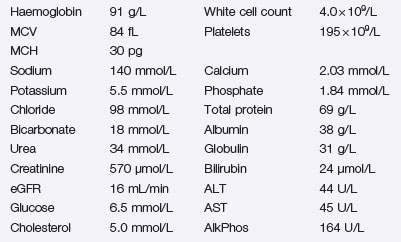Problem 37 A 47-year-old man with lethargy and hypertension
A 47-year-old car salesman attends the emergency department with a spontaneous epistaxis. His nose is packed before undergoing cautery by the ENT surgeons. He remarks that he has not been feeling particularly well over the last few weeks. He feels he is somewhat lacking in energy which he had attributed to not eating due to a lack of appetite. This has led to him having to bring his belt in by two notches. On questioning he admits to more frequent headaches than usual. He has not experienced any dysuria or symptoms of prostatism. He has had no vomiting or diarrhoea. He has not had any abdominal pain.
He has never attended the hospital before and thinks the last time he saw his general practitioner was as a child for a sore throat. He takes no regular medication apart from paracetamol for his headaches. His alcohol consumption averages around 30 units per week. He smoked 20 cigarettes per day until 6 years ago.
Examination reveals a rather unwell-looking gentleman. He is apyrexial, and neither cyanosed, jaundiced nor clinically anaemic. His heart rate is 68 beats per minute in sinus rhythm and his heart sounds are normal. Blood pressure is markedly elevated at 214/112 mmHg. His jugular venous pulse is not visible. Auscultation of his chest reveals vesicular breath sounds throughout with no added sounds. Palpation of his abdomen reveals no masses nor are there any ascites. There are, however, some excoriations which the patient believes are due to a new detergent his wife is using. There is no ankle oedema. Fundoscopy shows grade two hypertensive retinopathy. Neurological examination yields no abnormality.
You decide to admit him for further investigation.
The following blood results become available.




